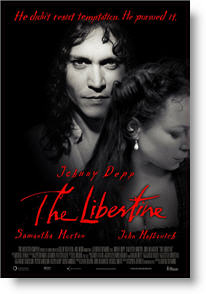The Libertine
 for strong sexuality including dialogue, violence and language.
for strong sexuality including dialogue, violence and language.
| Moral Rating: | not reviewed |
| Moviemaking Quality: |
|
| Primary Audience: | Adults |
| Genre: | Biography Foreign Comedy Drama Adaptation |
| Length: | 2 hr. 10 min. |
| Year of Release: | 2005 |
| USA Release: |
November 25, 2005 (LA/NY) January 13, 2006 (limited) March 10, 2006 (wide) |



Every time you buy a movie ticket or rent a video you are casting a vote telling Hollywood “That’s what I want.” Why does Hollywood continue to promote immoral programming? Are YOU part of the problem?
Why is the world the way it is? (filled with oppression, suffering, death and cruelty?) If God is all-knowing, all-powerful and loving, would he really create a world like this? Answer
How can I deal with temptations? Answer
Should I save sex for marriage? Answer
What are the consequences of sexual immorality? Answer
For a follower of Christ, what is LOVE—a feeling, an emotion, or an action?
What is true love and how do you know when you have found it?

Learn how to make your love the best it can be. Christian answers to questions about sex, marriage, sexual addictions, and more. Valuable resources for Christian couples, singles and pastors.
| Featuring | John Malkovich, Johnny Depp, Samantha Morton, Rosamund Pike, Tom Hollander |
| Director |
Laurence Dunmore, Laurence Dunmore |
| Producer | Chase Bailey, Ralph Kamp, Louise Goodsill |
| Distributor |
 Miramax, a division of beIN Media Group |
“He didn’t resist temptation. He pursued it.”
Here’s what the distributor says about their film: “Story of the Earl of Rochester, friend and of Charles II and a Restoration era pornographer and poet. He was an anti-monarchist Royalist and an atheist who converted to Christianity. The story is about how the Earl’s cynicism is thrown for a loop when he falls in love with a struggling young actress.
Johnny Depp stars in “The Libertine” as the scandalously decadent John Wilmot, the second Earl of Rochester. The film follows the Earl’s adventures in London, from his passionate romance with a young actress, Elizabeth Barry (Samantha Morton), to the writing of a scurrilous play which blisteringly and bawdily lampoons the very monarch who commissioned it, Charles II (John Malkovich), leading to the Earl’s banishment and eventual downfall.”
See list of Relevant Issues—questions-and-answers.


The prologue begins with Wilmot staring into the camera while arrogantly reminiscing over his ill-spent life, warning and taunting the audience “You will not like me” and “I don’t want you to like me.” The room is dark and foreboding, and except for Wilmot’s rants, eerily silent. Thus the stage is set to reflect upon the life of “Johnny” Wilmot, the pornographer and cynic of the golden age. According to the movie as well as the annals of history, Wilmot defiantly chose a life of sin. In the first act, Wilmot is sternly encouraged by his mother to “serve God” which produces a sly smirk upon his face. The rest of the movie discloses how Wilmot disregards his mother’s warning and the horrible consequences that befall upon this talented but misguided man.
The film depicts 17th century England as a dreary world mired in mud, where rats ran rampant and dogs defecated within the palace of the king. Apparently the hearts of men were much more corrupt and perverse. There are numerous scenes of fornication involving masturbation, fellatio, orgies, homosexuality and an obscene play written by the Earl of Rochester showcasing oversized dildos and chariots resembling male gentiles. Bare-breasted women and vulgar dialogue abound throughout the entirety of this movie. The “F” bomb is frequently dropped as well as other colorful adjectives.
The Earl of Rochester is a thorn in the side for England’s King Charles II (John Malkovich). Wilmot insults Charles on numerous occasions either to the king’s face or through his play. In the eyes of John Wilmot, nothing is sacred, and everything is fair game to ridicule.
Wilmot is unfaithful to his beloved wife, squandering money and ill spent energy with prostitutes and whores. He carries on an affair with a struggling stage actress whom he elevates to stardom. Wilmot uses his wit and written words to afflict pain and despair on his enemies as well as on those who love him. Wilmot even has the uncanny ability to predict the tragic outcome for those who choose to seek his companionship.
It is not until Wilmot is horribly disfigured from venereal disease and only a shadow of the man he once was that he heeds the words of his mother and wife and accepts God, albeit on his deathbed. Wilmot becomes intrigued with Isaiah 53, and as he states it, becomes a “deathbed convert.” The final act shows Wilmot coming to the aid of King Charles, although for selfish reasons.
The epilogue reveals Wilmot once again staring into the camera addressing the audience one last time, commenting on his wanton life and asking the question, “Do you like me now.” He repeats this line over and over again until the screen fades to black and the ending credits roll. It is these last words, which seem to suggest that the producers of this film may have felt that Wilmot’s conversion to Christianity may have been a ruse, a well thought out façade to save his reputation and secure his legacy with mankind.
I suppose whether or not Johnny Wilmot truly remained a cynic up until his death will remain a mystery for now. The truth is that only God and Mr. Wilmot know for certain the whereabouts of the soul of the man who lived life so madly and was struck down with venereal disease in the days of his youth, dieing prematurely at the early age of thirty-three years old. One thing the Christian audience should be aware of is this; Mr. Wilmot is no longer a cynic in the afterlife.
We Italians have a saying for such men as John Wilmot: “wasted talent.” Nonetheless, we of the faith fully understand that regardless of the life led, true repentance and devotion towards the Lord of Lords and King of Kings will cover up a multitude of sin, thus securing a place in heaven even for the most prominent of sinners. Regarding Mr. John Wilmot, I hope his conversation was sincere.
For those Christians deciding on whether or not to view this movie, may I be so bold as to offer you this gentle but sincere warning, “You will not like it.”
Very Offensive / 2
Extremely Offensive / 3
Extremely Offensive / 3
Extremely Offensive / 5


My Ratings: Extremely Offensive / 4